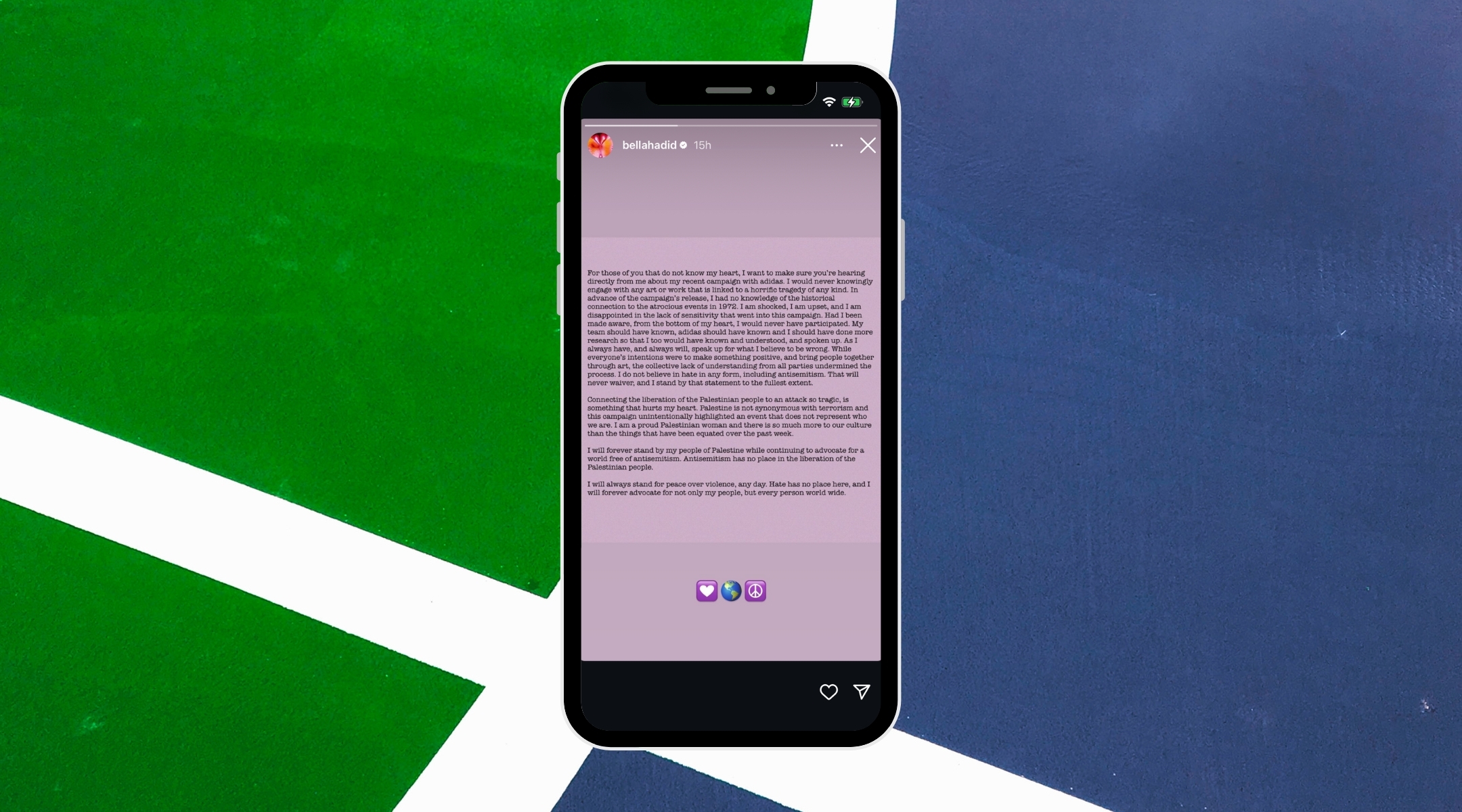Bella Hadid expressed regret for modeling an Adidas sneaker originally designed for the 1972 Munich Olympics, where 11 Israelis were murdered in a Palestinian terror attack.
Hadid, a Palestinian-American supermodel and activist, said in a statement that she had not known of the 1972 attack, which targeted Israel’s Olympic delegation. She spoke of a “collective lack of understanding” and said that she does “not believe in hate in any form, including antisemitism.” She posted the statement to Instagram on Monday.
“I would never knowingly engage with any art or work that is linked to a horrific tragedy of any kind,” Hadid said. “In advance of the campaign’s release, I had no knowledge of the historical connection to the atrocious events in 1972. I am shocked, I am upset, and I am disappointed in the lack of sensitivity that went into this campaign.”
She added, “Had I been made aware, from the bottom of my heart, I would never have participated. My team should have known, adidas should have known and I should have done more research so that I too would have known and understood, and spoken up.”

In a statement shared on her Instagram story on July 29, Palestinian-American supermodel Bella Hadid said, “I had no knowledge of the historical connection to the atrocious events in 1972.” (Screenshot via Instagram. Design by Jackie Hajdenberg)
Hadid’s statement comes after Adidas pulled the ad campaign last week in response to backlash and apologized to her and the other models in the campaign. “We made an unintentional mistake,” the company said in a statement. “We also apologize to our partners, Bella Hadid, ASAP Nast, Jules Koundé, and others, for any negative impact on them and we are revising the campaign.”
The Paris Olympics, which are currently underway, mark only the third time the games have commemorated the 1972 massacre, in which 11 athletes and coaches were killed, in addition to a West German police officer. Officials reportedly obscured the location of the commemoration due to security concerns. French authorities are also investigating death threats targeting three Israeli Olympic athletes in Paris, along with chants of “Heil Hitler” and Nazi salutes at a recent Israel-Paraguay Olympic soccer match.
Ahead of the Olympics, pro-Israel social media accounts had criticized the campaign and Adidas’ choice to hire Hadid to model the shoe, citing her history of harsh criticism of Israel. Hadid has also been accused of spreading misinformation about the Israel-Hamas war in Gaza and sharing content that downplays the experiences of Israeli hostages held in Gaza.
In her statement, Hadid lamented associations between Palestinian identity and terrorism.
“Palestine is not synonymous with terrorism and this campaign unintentionally highlighted an event that does not represent who we are,” she said. “I am a proud Palestinian woman and there is so much more to our culture than the things that have been equated over the past week.”
She added, “Antisemitism has no place in the liberation of the Palestinian people.”
The controversy marks yet another instance in recent years in which Adidas has faced criticism for antisemitism related to its design choices and celebrity affiliations. In April, the typeface for the German soccer team DFB’s jersey number 44 (which is not currently in use by the team, but which buyers could customize) was challenged as resembling the Nazi SS insignia. In 2022, following backlash, the company broke its lucrative partnership with Ye, the rapper and designer formerly known as Kanye West, after he made a string of antisemitic comments. The company’s founders were also members of the Nazi Party and made shoes for the regime.
JTA has documented Jewish history in real-time for over a century. Keep our journalism strong by joining us in supporting independent, award-winning reporting.






